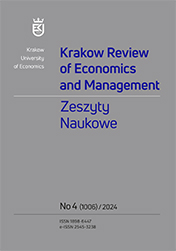Towards Better Knowledge Valorisation: The Perspective of Representatives of the European Commission
DOI:
https://doi.org/10.15678/krem.18698Słowa kluczowe:
knowledge valorisation, social impact, university, European CommissionAbstrakt
Objective: The aim of the article is to provide a perspective on the perception of knowledge valorisation by representatives of the European Commission and to answer the following questions: Does knowledge valorisation require the development of a special strategy? What contributes to valorisation success? What hinders knowledge valorisation? How can progress in knowledge valorisation be assessed?
Research Design & Methods: Qualitative research was conducted in the form of a group interview with representatives of the European Commission.
Findings: According to the European Commission representatives, steps in the field of knowledge valorisation are becoming a priority, but still remain a challenge. To ensure the success of valorisation, the involvement of all participants in the research and innovation ecosystem is essential, with universities playing a key role in this process. By creating knowledge that benefits citizens, scientists influence changes in their behaviours, which can contribute to economic, social, and environmental benefits. Unfortunately, this process is burdened by many barriers, and the lack of specific guidelines for measuring and evaluating social impact is a significant hindrance.
Implications / Recommendations: Though it does not provide specific metrics of social impact, the Europen Commission does support Member States by sharing the most up-to-date knowledge through its knowledge valorisation platform.
Contribution: The article presents the perspective of representatives of the European Commission on knowledge valorisation.
Pobrania
Bibliografia
Aiello, E., Donovan, C., Duque, E., Fabrizio, S., Flecha, R., Holm, P., Molina, S., Oliver, E., & Reale, E. (2021). Effective Strategies that Enhance the Social Impact of Social Sciences and Humanities Research. Evidence & Policy, 17(1), 131–146. https://doi.org/10.1332/174426420X15834126054137 DOI: https://doi.org/10.1332/174426420X15834126054137
Alsaawi, A. (2014). A Critical Review of Qualitative Interviews. European Journal of Business and Social Sciences, 3(4), 149–156. https://doi.org/10.2139/ssrn.2819536 DOI: https://doi.org/10.2139/ssrn.2819536
Andriessen, D. (2005). Value, Valuation, and Valorisation. In: G. Swarte (Ed.), Inspirerend innoveren; meerwarde door kennis. Kvie, 1–10.
Barszcz, M. (Ed.). (2016). Komercjalizacja B+R dla praktyków. NCBiR.
Benneworth, P., & Jongbloed, B. W. (2010). Who Matters to Universities? A Stakeholder Perspective on Humanities, Arts and Social Sciences Valorisation. Higher Education, 59(5), 567–588. https://doi.org/10.1007/s10734-009-9265-2 DOI: https://doi.org/10.1007/s10734-009-9265-2
Bode, C., Rogan, M., & Singh, J. (2019). Sustainable Cross-sector Collaboration: Building a Global Platform for Social Impact. Academy of Management Discoveries, 5(4), 396–414. https://doi.org/10.5465/amd.2018.0112 DOI: https://doi.org/10.5465/amd.2018.0112
Bruneel, J., D’Este, P., & Salter, A. (2010). Investigating the Factors that Diminish the Barriers to University–Industry Collaboration. Research Policy, 39(7), 858–868. https://doi.org/10.1016/j.respol.2010.03.006 DOI: https://doi.org/10.1016/j.respol.2010.03.006
Czernek, K. (2015). Wprowadzenie do badań jakościowych w naukach o zarządzaniu. In: W. Czakon (Ed.), Podstawy metodologii badań w naukach o zarządzaniu. Wydawnictwo Nieoczywiste.
de Jong, S. (2015). Engaging Scientists: Organising Valorisation in the Netherlands. Doctoral thesis. Rathenau Institute, Universiteit Leiden.
Dias, M., & Teles, A. C. (2023). Virtual Focus Group Methodology – Example from IT Industry. British Journal of Multidisciplinary and Advanced Studies: Engineering and Technology, 4(2), 1–13. https://doi.org/10.37745/bjmas.2022.0130 DOI: https://doi.org/10.37745/bjmas.2022.0130
European Council. (2022). Council Recommendation (EU) 2022/2415 of 2 December 2022 on the guiding principles for knowledge valorisation. Official Journal of the European Union, L 317/141.
European Commission. (2023). Commission Recommendation (EU) 2023/499 of 1 March 2023 on a Code of Practice on the management of intellectual assets for knowledge valorisation in the European Research Area. Official Journal of the European Union, L 69/75.
European Commission. (2024a). EU Valorisation Policy: Making Research Results Work for Society. Retrieved from: https://research-and-innovation.ec.europa.eu/research-area/industrial-research-and-innovation/eu-valorisation-policy_en (accessed: 26.02.2024).
European Commission. (2024b). Knowledge Valorisation Platfrom. Retrieved from: https://research-and-innovation.ec.europa.eu/research-area/industrial-research-and-innovation/eu-valorisation-policy/knowledge-valorisation-platform_en (accessed: 20.12.2023).
Flisiuk, B., & Gołąbek, A. (2015). Możliwości komercjalizacji wyników badań naukowych w instytutach badawczych – modele, procedury, bariery oraz dobre praktyki. Zeszyty Naukowe Politechniki Śląskiej. Organizacja i Zarządzanie, 77, 63–73.
Forman, J., & Damschroder, L. (2007). Qualitative Content Analysis. In: L. Jacoby, L. A. Siminoff (Eds), Empirical Methods for Bioethics: A Primer (pp. 39–62). Emerald Group Publishing. https://doi.org/10.1016/S1479-3709(07)11003-7 DOI: https://doi.org/10.1016/S1479-3709(07)11003-7
Garbade, P. J. P., Omta, S. W. F., Fortuin, F. T. J. M., Hall, R., & Leone, G. (2013). The Impact of the Product Generation Life Cycle on Knowledge Valorization at the Public Private Research Partnership, the Centre for BioSystems Genomics. NJAS: Wageningen Journal of Life Sciences, 67(1), 1–10. https://doi.org/10.1016/j.njas.2013.07.002 DOI: https://doi.org/10.1016/j.njas.2013.07.002
Gierulski, W., Santarek, K., & Wiśniewska, J. (2020). Komercjalizacja i transfer technologii. PWE.
Glinka, B., & Czakon, W. (2021). Podstawy badań jakościowych. PWE.
Hladchenko, M. (2016). Knowledge Valorisation: A Route of Knowledge That Ends in Surplus Value (an Example of the Netherlands). International Journal of Educational Management, 30(5), 668–678. https://doi.org/10.1108/IJEM-12-2014-0167 DOI: https://doi.org/10.1108/IJEM-12-2014-0167
Kleiner-Schaefer, T., & Schaefer, K. J. (2022). Barriers to University–Industry Collaboration in an Emerging Market: Firm-level Evidence from Turkey. Journal of Technology Transfer, 47(3), 872–905. https://doi.org/10.1007/s10961-022-09919-z DOI: https://doi.org/10.1007/s10961-022-09919-z
Kumar, J. A., & Ganesh, L. S. (2009). Research on Knowledge Transfer in Organizations: A Morphology. Journal of Knowledge Management, 13(4), 161–174. https://doi.org/10.1108/13673270910971905 DOI: https://doi.org/10.1108/13673270910971905
Selvi, A. F. (2019). Qualitative Content Analysis. In: J. McKinley, H. Rose (Eds), The Routledge Handbook of Research Methods in Applied Linguistics (pp. 440–452). Routledge. DOI: https://doi.org/10.4324/9780367824471-37
Tartari, V., Salter, A., & D’Este, P. (2012). Crossing the Rubicon: Exploring the Factors that Shape Academics’ Perceptions of the Barriers to Working with Industry. Cambridge Journal of Economics, 36(3), 655–677. https://doi.org/10.1093/cje/bes007 DOI: https://doi.org/10.1093/cje/bes007
Trust, S. (2019). Knowledge Valorisation for Inclusive Innovation and Integrated African Development. In: S. O. Oloruntoba, M. Muchie (Eds), Innovation, Regional Integration, and Development in Africa. Rethinking Theories, Institutions, and Policies (pp. 93–103). Springer. https://doi.org/10.1007/978-3-319-92180-8_7 DOI: https://doi.org/10.1007/978-3-319-92180-8_7
van de Burgwal, L. H. M., Dias, A., & Claassen, E. (2019). Incentives for Knowledge Valorisation: A European Benchmark. The Journal of Technology Transfer, 44(1), 1–20. https://doi.org/10.1007/s10961-017-9594-8 DOI: https://doi.org/10.1007/s10961-017-9594-8
Pobrania
Opublikowane
Numer
Dział
Licencja
Prawa autorskie (c) 2024 Uniwersytet Ekonomiczny w Krakowie

Utwór dostępny jest na licencji Creative Commons Uznanie autorstwa 4.0 Międzynarodowe.

